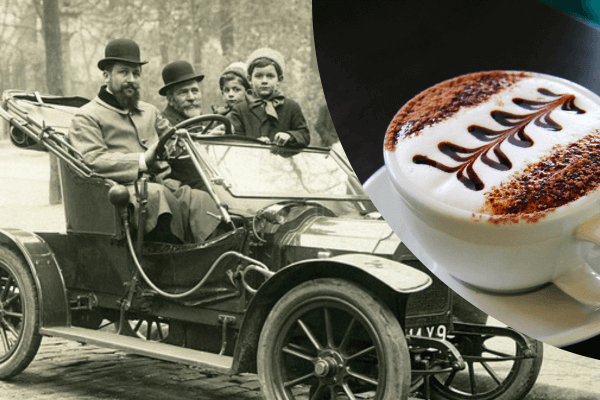The World Wars of the 20th century were marked by immense human suffering, widespread destruction, and the reshaping of global political and social landscapes. Amidst the chaos and turmoil, there was one humble beverage that played a significant role in the lives of soldiers and civilians alike – coffee.
In this article, we will explore the remarkable journey of coffee during the World Wars and how it evolved from a simple beverage to a vital commodity that provided sustenance, comfort, and a taste of home to those affected by the conflicts.
The outbreak of World War I in 1914 ushered in a new era of warfare and challenges for soldiers on the front lines. As armies mobilized and battles raged, the demand for essential supplies, including food and beverages, became increasingly critical.
Coffee, with its stimulating properties and ability to provide much-needed energy, quickly emerged as a staple in soldiers’ rations. The caffeine in coffee helped combat fatigue, allowing soldiers to stay alert during long hours of duty and withstand the physical and mental strains of war.
But coffee’s significance went beyond its practical benefits. It became a symbol of comfort, a connection to home, and a source of solace in the midst of the horrors of war.
As soldiers huddled around campfires or took a brief respite in the trenches, a steaming cup of coffee provided a momentary reprieve from the harsh realities of battle. Its aroma, warmth, and familiar taste offered a semblance of normalcy in an otherwise chaotic and uncertain environment.
Back on the home front, coffee played a crucial role in boosting morale and supporting the war effort. Coffeehouses, which had long served as hubs of social interaction and intellectual discourse, took on a new significance during the wars.
Families and friends of soldiers gathered in coffeehouses, seeking solace, sharing news, and finding support in one another. These spaces became important communal centers where civilians could connect with others going through similar experiences and find comfort in the shared rituals of coffee consumption.
Furthermore, coffee became intertwined with propaganda efforts during the World Wars. Images of soldiers enjoying a cup of coffee were used to shape public perceptions and rally support for the war.
Coffee came to symbolize resilience, strength, and unity, reinforcing patriotic sentiments and a sense of collective purpose.
As the demand for coffee surged, innovative solutions were developed to ensure its availability. Instant coffee, a convenient and lightweight option, was introduced to meet the needs of soldiers in the field.
This powdered form of coffee could be easily prepared by mixing it with hot water, eliminating the need for brewing equipment and saving precious time. Additionally, coffee was incorporated into field rations, ensuring that soldiers had access to a familiar and comforting beverage even in the most challenging conditions.
The importance of coffee extended beyond its practical and psychological effects. Coffee became a form of currency during times of scarcity and trade disruptions.
Soldiers and civilians alike used coffee to barter and trade for other goods and necessities. Its portable nature, widespread popularity, and universal appeal made it an ideal medium of exchange in a world grappling with shortages and rationing.
The legacy of coffee during the World Wars continued even after the conflicts had ended. Coffee consumption continued to rise, reflecting its newfound popularity and the lasting impact of wartime experiences.
Coffeehouses, once again thriving, became spaces where communities could come together, share stories, and rebuild in the aftermath of war.
Coffee’s role during the World Wars cannot be understated. It provided soldiers with the much-needed sustenance and energy to endure the hardships of war. It offered a sense of comfort, a taste of home, and a momentary escape from the chaos of battle.
Coffee became a powerful symbol of resilience, unity, and support for those affected by the conflicts. Its availability and popularity skyrocketed, leading to innovative solutions such as instant coffee and its use as a form of currency.
Even long after the wars had ended, the legacy of coffee endured, with coffeehouses serving as communal spaces for rebuilding and reconnecting.
The story of coffee during the World Wars is a testament to its enduring significance and its ability to bring people together even in the most challenging of times.
Coffee Rations: Keeping Soldiers Alert and Awake
During the World Wars, coffee rations became an essential part of soldiers’ daily lives, providing them with much-needed energy and alertness on the battlefield. Recognizing the importance of coffee’s stimulating properties, military authorities ensured that soldiers had access to this vital beverage.
Coffee became a valuable resource that fueled the troops, helping them stay alert during long hours of duty. Whether on the front lines or in the trenches, soldiers relied on the energizing effects of coffee to combat fatigue and maintain their focus.
It became an integral part of their daily routine, a necessary boost to keep them going in the face of immense challenges.
In the midst of war, coffee rations took on a symbolic significance beyond their practical benefits. A cup of coffee became a moment of respite, a comforting ritual that offered a brief escape from the harsh realities of battle.
It provided soldiers with a taste of familiarity, a connection to their homes and loved ones thousands of miles away.
The distribution of coffee rations was carefully managed, with military units ensuring that every soldier received their fair share. Whether it was in the form of pre-ground coffee or instant coffee packets, these rations were a lifeline for soldiers, offering a small but significant source of comfort amidst the chaos of war.
Coffee rations also served as a means of camaraderie among soldiers. Sharing a cup of coffee became a bonding experience, a moment to connect and find solace in the company of comrades.
It provided an opportunity for soldiers to exchange stories, offer support, and forge lasting friendships in the most challenging of circumstances.
Furthermore, coffee rations played a role in maintaining morale and boosting the overall spirit of the troops. The aroma of freshly brewed coffee wafting through the air created a sense of familiarity and normalcy, reminding soldiers of their pre-war lives and providing a small taste of home.
It became a symbol of comfort and solidarity, reinforcing the sense of unity and purpose among the ranks.
In conclusion, coffee rations played a vital role in keeping soldiers alert and awake during the World Wars. Beyond their practical benefits, these rations offered soldiers a much-needed boost of energy, a momentary respite from the challenges of war, and a connection to their homes and loved ones.
Coffee became a symbol of camaraderie, offering soldiers a shared experience and a sense of comfort in the most trying times. The distribution of coffee rations not only fueled the troops but also served as a reminder of the importance of maintaining morale and unity on the battlefield.
Coffee as Currency: Bartering and Trading during Shortages
As wartime economies faced shortages and rationing of various goods, coffee emerged as a valuable form of currency. Soldiers and civilians alike would use coffee to barter and trade for other necessities or desired items.
Its portable nature and widespread popularity made it a convenient medium of exchange in times of scarcity.
Coffee on the Home Front: Boosting Morale and Support
Back on the home front, coffee played a crucial role in boosting morale and supporting the war effort. Coffeehouses became gathering places for families and friends of soldiers, providing a sense of community and a space to share news and support.
Women’s organizations would set up coffee stations to serve troops, recognizing the comfort and encouragement a simple cup of coffee could provide.
Coffee and Propaganda: The Power of Perceptions
Coffee, like many other commodities, was used in wartime propaganda to shape public perceptions and rally support. Images of soldiers enjoying a cup of coffee portrayed a sense of resilience, strength, and unity. Coffee became symbolic of patriotism and a connection to the soldiers fighting for their country.
Coffee Innovation: Instant Coffee and Field Rations
The demands of wartime led to coffee innovation, particularly in the form of instant coffee. Instant coffee was developed as a convenient and lightweight option for soldiers in the field. It provided a quick and easy way to prepare a cup of coffee without the need for brewing equipment.
Similarly, coffee was incorporated into field rations, ensuring that soldiers had access to a familiar and comforting beverage even in challenging conditions.
Coffee as a Comfort from Home: Care Packages and Red Cross Efforts
Care packages sent to soldiers often included coffee, recognizing its importance as a source of comfort and a taste of home. Organizations like the Red Cross made efforts to provide coffee to troops, recognizing its value in boosting morale and providing a sense of normalcy amidst the chaos of war.
Coffee’s Resilience: Adapting to Supply Chain Disruptions
Despite supply chain disruptions during wartime, coffee managed to find its way to the front lines. Creative solutions were implemented to ensure that soldiers had access to this cherished beverage. From air-dropping coffee to developing compact coffee kits for soldiers, coffee’s resilience prevailed.
Post-War Coffee Consumption: Shaping Post-Conflict Societies
The experience of coffee during the World Wars had a lasting impact on post-conflict societies. Coffee consumption continued to rise, reflecting its newfound popularity and its association with wartime experiences.
The coffeehouse culture that emerged during wartime continued to flourish, serving as gathering places for communities to come together, share stories, and rebuild.
Coffee’s Contribution to Veterans’ Welfare
Coffee has also played a role in supporting veterans’ welfare programs. Organizations and initiatives have recognized the positive impact of coffee on veterans’ well-being and have used it as a means of connection, support, and fundraising.
Coffee as a Reminder of History: Honoring the Legacy
Today, coffee serves as a reminder of the vital role it played during the World Wars. It symbolizes the resilience, camaraderie, and comfort that coffee brought to soldiers and communities during times of conflict. As we sip our morning coffee, let us remember the sacrifices made and the power of this humble beverage.
Conclusion:
In the midst of the tumultuous World Wars, coffee emerged as a vital commodity that provided sustenance, comfort, and a sense of normalcy to soldiers and civilians alike. Its role went far beyond being a mere beverage, as it became a symbol of resilience, unity, and support in times of conflict.
Coffee’s journey during this period showcased its adaptability, practicality, and emotional significance.
During the World Wars, coffee played a crucial role in the lives of soldiers on the front lines. Its stimulating properties provided much-needed energy, helping combat fatigue and enabling soldiers to stay alert during long hours of duty.
But its impact went beyond physical effects. Coffee became a source of comfort, offering a momentary reprieve from the harsh realities of war. It provided soldiers with a taste of home, a familiar and soothing drink amidst the chaos and uncertainty of battle.
Back on the home front, coffeehouses became essential gathering places for families and friends of soldiers. These spaces offered solace, support, and a sense of community during trying times.
Coffeehouses provided an environment where civilians could share news, find comfort, and connect with others going through similar experiences. They became symbols of resilience and unity, reinforcing the collective purpose and patriotic sentiments of the war effort.
The popularity and demand for coffee soared during the World Wars, prompting the development of innovative solutions to ensure its availability. Instant coffee emerged as a convenient option for soldiers, allowing them to prepare a cup of coffee quickly and easily in the field.
This powdered form of coffee revolutionized coffee consumption, eliminating the need for brewing equipment and saving precious time. Additionally, coffee became a valuable medium of exchange during times of scarcity and trade disruptions, serving as a form of currency in bartering and trading for other goods and necessities.
The influence of coffee during the World Wars extended beyond its practical and psychological effects. It left a lasting legacy in the post-war era, with coffee consumption continuing to rise and coffeehouses reclaiming their role as vibrant social spaces.
Coffee became deeply embedded in cultural and social fabric, shaping modern society and fostering connections among communities.
The story of coffee during the World Wars is a testament to its enduring significance and its ability to adapt to challenging circumstances. It provided sustenance, comfort, and a sense of normalcy to those affected by the conflicts.
Coffee brought people together, transcending borders and cultural differences, as it became a universal symbol of shared experiences and resilience.
In conclusion, coffee played an integral part in the World Wars, serving as a vital commodity that fueled both physical and emotional needs.
It supported soldiers on the front lines, brought solace to families and friends at home, and became a medium of exchange in a world grappling with shortages and rationing. Its legacy continued long after the wars ended, with coffeehouses serving as spaces for rebuilding and reconnecting communities.
Coffee’s journey during the World Wars is a testament to its enduring impact and its ability to provide sustenance, comfort, and a sense of unity during times of conflict.



